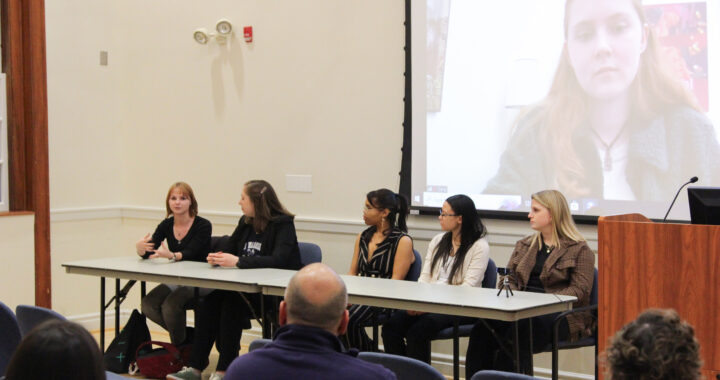Ukraine-Russia conflict sparks discussion in political science and international relations classes
4 min read
Professor Jason Davidson is using the conflict as a teaching lesson to show students a real life example of International Affairs. | Artem Kniaz / Unsplash
by GRACE SCHUMACHER
Senior Writer
Jason Davidson, professor of political science and international affairs at the University of Mary Washington, is watching the escalating tension between Russia and Ukraine. So are his students.
Within the political science and international affairs department, the goal is to provide students with a broad knowledge of the contemporary international system as well as to examine international affairs from a variety of disciplinary perspectives. As an instructor of the courses Introduction to International Relations and Security and Conflict, Davidson sees the rapidly changing developments as a topic for class discussion.
“Perhaps the two most important prior events,” said Davidson, “were the 2008 Bucharest Declaration, wherein NATO members made a public statement that Ukraine would join NATO someday, and Russia’s 2014 military intervention in Ukraine and annexation of Crimea.”
Acknowledging the history between these two countries is vital to understanding these current events. A key player in this conflict is Russia’s President, Vladimir V. Putin, who has a long record of military activism.
“He is looking to increase Russia’s prestige and re-establish a sphere of influence in Eastern Europe, as well as reinforce his domestic political position,” said Davidson.
This past month, Russia has steadily increased its military presence along the Ukrainian border, bolstering fears of an attack. Close to 1,000 troops have been assembled, according to the New York Times, which have worked to escalate apprehensions that a repeat of the 2014 Russian invasion could occur again.
The Russian government, according to an article from CNN, has also listed a series of grievances and made a series of demands, including that Ukraine never be allowed to enter the NATO alliance.
U.S. Secretary of State Antony Blinken recently held further diplomatic consultations in both Ukraine and Germany, according to an article from NPR. He met on Friday, Jan. 21 with the Russian foreign minister in Geneva. Meanwhile, the Biden administration said it is providing an additional $200 million in defensive military aid to the country amid increasing fears of a Russian attack.
These current events also translate into Davidson’s coursework and class discussions.
“I’ve discussed the crisis with students in both my Intro. to International Relations (PSCI 102) and Security and Conflict (PSCI 387) classes,” said Davidson. The students appear divided in their opinions. As a requirement of his PSCI 387 course, Davidson has his students create blog posts about the crisis.
“My Intro class significantly favored U.S. military action to prevent the invasion of Ukraine,” said Davidson. “Interestingly, in my Security and Conflict studies class, I was surprised that they saw the crisis as being driven by Russia’s sincere security concerns.”
Altan Murray, a sophomore political science major in Davidson’s Security and Conflict Studies course, said that he is able to apply the concepts he is being taught in class to the ongoing crisis.
“The Russia-Ukraine conflict has provided current real-world examples for core concepts and theories being taught,” said Murray. “It’s been fascinating learning about IR and security during such an unpredictable situation.”
Real-life issues and current events give students a different perspective than their textbooks. Murray is encouraged to express his opinions freely in Davidson’s course as well as debate with other students about the topic of U.S. involvement.
“I think the U.S. needs to try to resolve this issue diplomatically and avoid military conflict as best as they can,” said Murray. “The U.S. should impose harsh sanctions on Russia if they move troops into Ukraine, but there is significant evidence that suggests sanctions are ineffective, so it’s difficult to know how that will impact Russian actions.”
Students of David Hamon, a professor in the political science and international affairs department, are also taking interest in the conflict between Russia and Ukraine.
“This issue has sparked lively discussion,” said Hamon. “There is much interest in what’s happening with the crisis. Students are interested in understanding the conflict and understanding Putin’s motivations.”
In his American Foreign Policy course, the goal is to investigate problems facing the U.S. in its search for national security and international stability.
“My classes begin with a general discussion on current events,” said Hamon, “and the Ukrainian crisis has dominated the conversation.”
Eleanor Haas, a senior cybersecurity major, is a student in Hamon’s American Foreign Policy course.
“We talk a lot about what’s going on in Ukraine with our current events,” said Haas. “So far a lot of our time has been talking about the causes of the crisis, how the U.S. and NATO have handled it so far, as well as what we think they should do next. We all have a lot of different ideas on why it’s happening, so there’s a lot of debate.”











